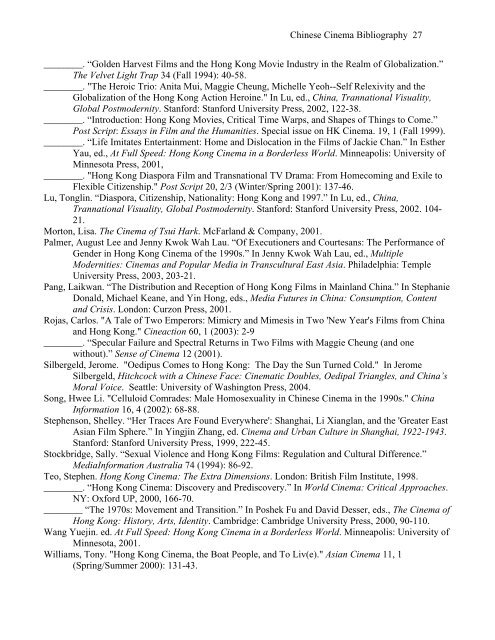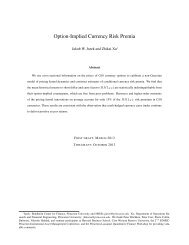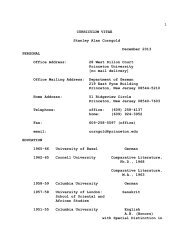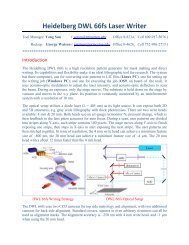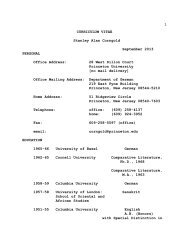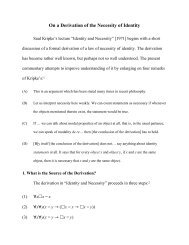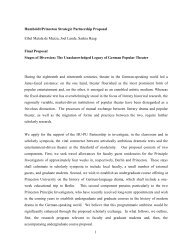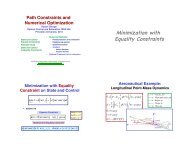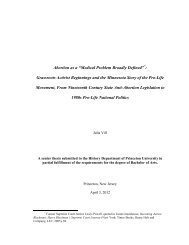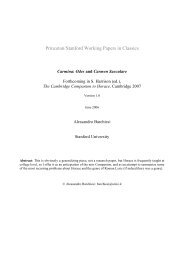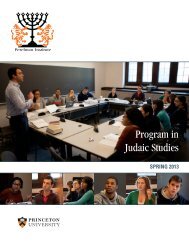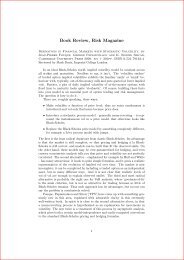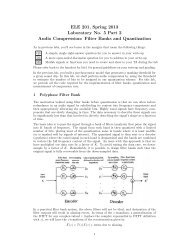A Selected Bibliography of Chinese Cinema - Princeton University
A Selected Bibliography of Chinese Cinema - Princeton University
A Selected Bibliography of Chinese Cinema - Princeton University
Create successful ePaper yourself
Turn your PDF publications into a flip-book with our unique Google optimized e-Paper software.
<strong>Chinese</strong> <strong>Cinema</strong> <strong>Bibliography</strong> 27<br />
________. “Golden Harvest Films and the Hong Kong Movie Industry in the Realm <strong>of</strong> Globalization.”<br />
The Velvet Light Trap 34 (Fall 1994): 40-58.<br />
________. "The Heroic Trio: Anita Mui, Maggie Cheung, Michelle Yeoh--Self Relexivity and the<br />
Globalization <strong>of</strong> the Hong Kong Action Heroine." In Lu, ed., China, Trannational Visuality,<br />
Global Postmodernity. Stanford: Stanford <strong>University</strong> Press, 2002, 122-38.<br />
________. “Introduction: Hong Kong Movies, Critical Time Warps, and Shapes <strong>of</strong> Things to Come.”<br />
Post Script: Essays in Film and the Humanities. Special issue on HK <strong>Cinema</strong>. 19, 1 (Fall 1999).<br />
________. “Life Imitates Entertainment: Home and Dislocation in the Films <strong>of</strong> Jackie Chan.” In Esther<br />
Yau, ed., At Full Speed: Hong Kong <strong>Cinema</strong> in a Borderless World. Minneapolis: <strong>University</strong> <strong>of</strong><br />
Minnesota Press, 2001,<br />
________. "Hong Kong Diaspora Film and Transnational TV Drama: From Homecoming and Exile to<br />
Flexible Citizenship." Post Script 20, 2/3 (Winter/Spring 2001): 137-46.<br />
Lu, Tonglin. “Diaspora, Citizenship, Nationality: Hong Kong and 1997.” In Lu, ed., China,<br />
Trannational Visuality, Global Postmodernity. Stanford: Stanford <strong>University</strong> Press, 2002. 104-<br />
21.<br />
Morton, Lisa. The <strong>Cinema</strong> <strong>of</strong> Tsui Hark. McFarland & Company, 2001.<br />
Palmer, August Lee and Jenny Kwok Wah Lau. “Of Executioners and Courtesans: The Performance <strong>of</strong><br />
Gender in Hong Kong <strong>Cinema</strong> <strong>of</strong> the 1990s.” In Jenny Kwok Wah Lau, ed., Multiple<br />
Modernities: <strong>Cinema</strong>s and Popular Media in Transcultural East Asia. Philadelphia: Temple<br />
<strong>University</strong> Press, 2003, 203-21.<br />
Pang, Laikwan. “The Distribution and Reception <strong>of</strong> Hong Kong Films in Mainland China.” In Stephanie<br />
Donald, Michael Keane, and Yin Hong, eds., Media Futures in China: Consumption, Content<br />
and Crisis. London: Curzon Press, 2001.<br />
Rojas, Carlos. "A Tale <strong>of</strong> Two Emperors: Mimicry and Mimesis in Two 'New Year's Films from China<br />
and Hong Kong." Cineaction 60, 1 (2003): 2-9<br />
________. “Specular Failure and Spectral Returns in Two Films with Maggie Cheung (and one<br />
without).” Sense <strong>of</strong> <strong>Cinema</strong> 12 (2001).<br />
Silbergeld, Jerome. "Oedipus Comes to Hong Kong: The Day the Sun Turned Cold." In Jerome<br />
Silbergeld, Hitchcock with a <strong>Chinese</strong> Face: <strong>Cinema</strong>tic Doubles, Oedipal Triangles, and China’s<br />
Moral Voice. Seattle: <strong>University</strong> <strong>of</strong> Washington Press, 2004.<br />
Song, Hwee Li. "Celluloid Comrades: Male Homosexuality in <strong>Chinese</strong> <strong>Cinema</strong> in the 1990s." China<br />
Information 16, 4 (2002): 68-88.<br />
Stephenson, Shelley. “Her Traces Are Found Everywhere': Shanghai, Li Xianglan, and the 'Greater East<br />
Asian Film Sphere.” In Yingjin Zhang, ed. <strong>Cinema</strong> and Urban Culture in Shanghai, 1922-1943.<br />
Stanford: Stanford <strong>University</strong> Press, 1999, 222-45.<br />
Stockbridge, Sally. “Sexual Violence and Hong Kong Films: Regulation and Cultural Difference.”<br />
MediaInformation Australia 74 (1994): 86-92.<br />
Teo, Stephen. Hong Kong <strong>Cinema</strong>: The Extra Dimensions. London: British Film Institute, 1998.<br />
________. “Hong Kong <strong>Cinema</strong>: Discovery and Prediscovery.” In World <strong>Cinema</strong>: Critical Approaches.<br />
NY: Oxford UP, 2000, 166-70.<br />
________ “The 1970s: Movement and Transition.” In Poshek Fu and David Desser, eds., The <strong>Cinema</strong> <strong>of</strong><br />
Hong Kong: History, Arts, Identity. Cambridge: Cambridge <strong>University</strong> Press, 2000, 90-110.<br />
Wang Yuejin. ed. At Full Speed: Hong Kong <strong>Cinema</strong> in a Borderless World. Minneapolis: <strong>University</strong> <strong>of</strong><br />
Minnesota, 2001.<br />
Williams, Tony. "Hong Kong <strong>Cinema</strong>, the Boat People, and To Liv(e)." Asian <strong>Cinema</strong> 11, 1<br />
(Spring/Summer 2000): 131-43.


